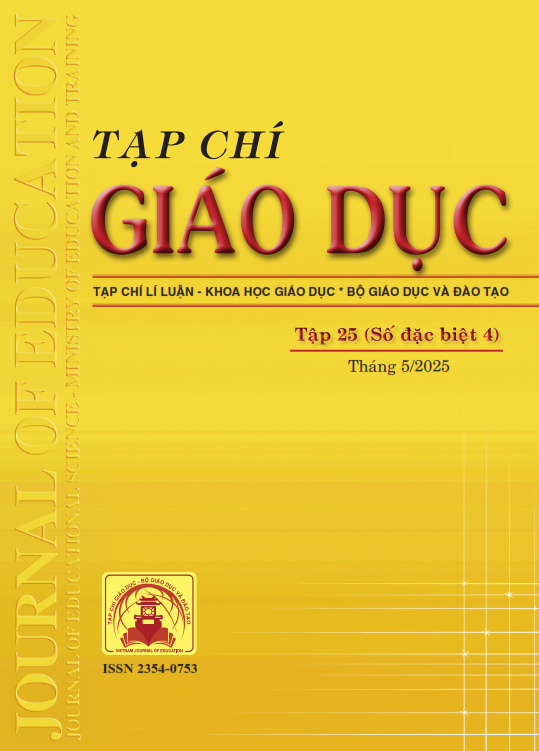Nghiên cứu đề xuất bộ tiêu chí đánh giá hệ sinh thái học tập sáng tạo: Trường hợp trường trung học cơ sở tại thành phố Hà Nội
Tóm tắt
The Creative Learning Ecosystem is a system that includes learning subjects, learning content, technology, learning context, culture and strategy, which exists both inside and outside an organization and has an impact on both formal and informal learning processes. The Creative Learning Ecosystem assessment toolkit plays an important role in measuring, monitoring and improving the environment to promote the achievement of educational goals. This article proposes the Creative Learning Ecosystem Assessment Toolkit in secondary schools in Hanoi, analyzes the current status of awareness of the role and suitability of this toolkit, thereby orienting the application methods in schools to contribute to improving the quality of general education today. The survey shows that managers and teachers in secondary schools consistently appreciate the role and suitability of the toolkit. This is an important basis for completing and appropriately applying the Creative Learning Ecosystem Assessment Toolkit in current secondary schools.
Tài liệu tham khảo
Bednář, P., Danko, L., & Smékalová, L. (2021). Coworking Spaces and Creative Communities: Making Resilient Coworking Spaces Through Knowledge Sharing and Collective Learning. European Planning Studies, 31(3), 490-507. https://doi.org/10.1080/09654313.2021.1944065
Benita, F., Virupaksha, D., Wilhelm, E., & Tunçer, B. (2021). A smart learning ecosystem design for delivering Data-driven Thinking in STEM education. Smart Learning Environments, 8, 1-20.
Đỗ Hồng Cường, Định Thị Kim Thương, Đặng Lan Phương, Nguyễn Hồng Chiến (2022). Nghiên cứu mô hình hệ sinh thái học tập sáng tạo trong các trường phổ thông. Tạp chí Khoa học, Trường Đại học Thủ đô Hà Nội, 59, 105-112.
Guilford, J. P. (1967). The nature of human intelligence. McGraw-Hill.
Giovannella, C. (2022), At the Root of the Smart Cities: Smart Learning Ecosystems to Train Smart Citizens
Johnston, C. B., Herzog, T. K., Hill-Chapman, C. R., Siney, C., & Fergusson, A. (2019). Creating Positive Learning Environments in Early Childhood Using Teacher-Generated Prosocial Lessons. Journal of Educational Research and Practice, 9(1). https://doi.org/10.5590/JERAP.2019.09.1.10
Kangas, M. (2010). Creative and playful learning: Learning through game co-creation and games in a playful learning environment. Thinking Skills and Creativity, 5(1), 1-15. https://doi.org/10.1016/j.tsc.2009.11.001
Komorowski, M., Lupu, R., Pepper, S. L., & Lewis, J. (2021). Joining the Dots—Understanding the Value Generation of Creative Networks for Sustainability in Local Creative Ecosystems. Sustainability. https://doi.org/10.3390/su132212352
Nguyen Manh Hung & Nguyen Hoai Nam (2013). On the Procedural Structure of Learning Ecosystem Toward Competency Learning Model. Journal of Science, Ho Chi Minh City Universiry of Education, 53, 15-25.
Nguyễn Mạnh Hùng (2013a). Learning Ecosystem - Hệ sinh thái học tập nhìn từ lí thuyết học tập kết nối và lí thuyết hệ thống. Tạp chí Khoa học, Trường Đại học Sư phạm Hà Nội, 58(4), 34-44.
Nguyễn Mạnh Hùng (2013b). Một số vấn đề về MOOC và mô hình ứng dụng COOC tại Việt Nam. Tạp chí Khoa học giáo dục, 93, 10-12; 23.
Petrovic, N. N., Dimovski, V., Peterlin, J., Meško, M., & Roblek, V. (2021). Data-Driven Solutions in Smart Cities: The case of Covid-19. Companion of the World Wide Web Conference 2021, 648-656. https://doi.org/10.1145/3442442.3453469
Siemens, G. (2005). Connectivism: A Learning Theory for the Digital Age. International Journal of Instructional Technology and Distance Learning, 2(1), 3-10.
Thành ủy Hà Nội (2021). Chương trình 1217-CTr-ĐHTĐN “Phát triển Hệ sinh thái học tập sáng tạo ở các cấp học trên địa bàn thành phố Hà Nội”.
Ủy ban nhân dân thành phố Hà Nội (2022). Quyết định số 4906/QĐ-UBND ngày 08/12/2022 phê duyệt chương trình phát triển mô hình “Hệ sinh thái học tập, sáng tạo” ở các cấp học trên địa bàn thành phố Hà Nội.
Vinet, L., & Zhedanov, A. (2011). A “missing” family of classical orthogonal polynomials. Journal of Physics A: Mathematical and Theoretical, 44(8), 6. https://doi.org/10.1088/1751-8113/44/8/085201
Wallas, G. (1926). The art of thought. New York: Harcourt, Brace.
Đã Xuất bản
Cách trích dẫn
Số
Chuyên mục
Giấy phép

Tác phẩm này được cấp phép theo Ghi nhận tác giả của Creative Commons Giấy phép quốc tế 4.0 .












